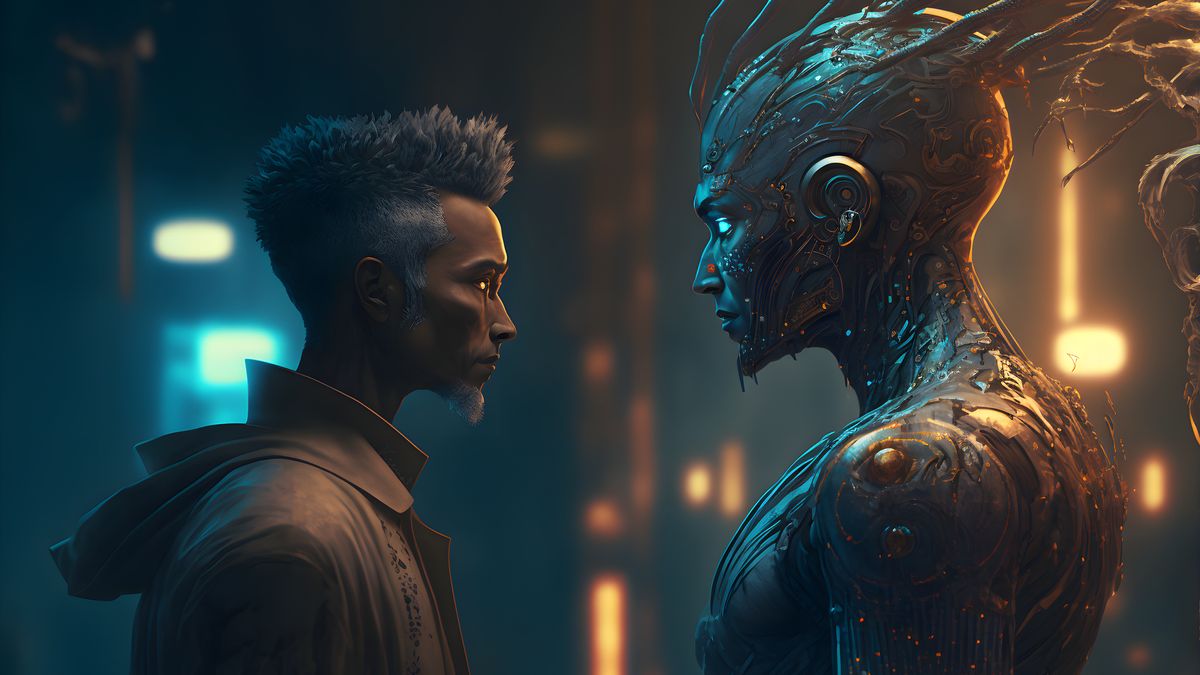Artificial Intelligence vs. Human Intelligence: Who Wins the Battle? - AI vs. human intelligence

In an era where technology is advancing at an unprecedented pace, the debate between Artificial Intelligence (AI) and Human Intelligence has become a topic of immense significance. As we witness AI systems evolving and becoming more sophisticated, the question that looms large is, "Who wins the battle?" Are machines poised to surpass human intellect, or do the unique qualities of human intelligence continue to hold the upper hand? This article will delve into the intriguing realm of AI vs. human intelligence, exploring their strengths, limitations, and the potential for collaboration.
Table of Contents
1. Introduction
- Understanding the Significance
- The Evolution of AI
2. The Power of Artificial Intelligence
- Data Processing Abilities
- Speed and Efficiency
- Lack of Emotional Bias
3. The Limitations of Artificial Intelligence
- Creativity and Imagination
- Empathy and Emotional Intelligence
- Ethical Concerns
4. Human Intelligence: Uniquely Human
- Complex Problem Solving
- Emotional Depth and Connection
- Adaptability
5. Collaborative Synergy: Humans and AI
- Enhancing Human Abilities
- AI in Healthcare
- AI in Creativity
6. The Future of Intelligence
- Ethical Considerations
- Ensuring a Balanced Future
1. Introduction
Understanding the Significance
The emergence of Artificial Intelligence has brought about transformative changes in various industries, from healthcare to finance. It has the potential to automate tasks, process vast amounts of data, and assist humans in ways previously unimaginable. To understand the future landscape of intelligence, it's crucial to examine the evolution of AI.
The Evolution of AI
Artificial Intelligence has evolved from basic rule-based systems to complex neural networks that can mimic human cognitive functions. This progress raises the question: Can AI outperform humans in all aspects of intelligence, or are there inherent limitations?
2. The Power of Artificial Intelligence
Data Processing Abilities
One of AI's undeniable strengths is its ability to process vast datasets swiftly and accurately. Machine learning algorithms can detect patterns, make predictions, and analyze information at a scale that surpasses human capacity.
Speed and Efficiency
AI operates at lightning speed, making it invaluable in tasks where rapid decision-making is crucial. Whether it's financial trading or diagnosing medical conditions, AI's speed can be a game-changer.
Lack of Emotional Bias
Unlike humans, AI lacks emotions and biases. This impartiality can be advantageous in decision-making processes, reducing the risk of subjective errors.
3. The Limitations of Artificial Intelligence
Creativity and Imagination
While AI can generate art, music, and even write articles, its creativity is algorithmic and lacks the depth of human creativity driven by emotions and experiences.
Empathy and Emotional Intelligence
AI may mimic empathy, but it cannot truly understand or relate to human emotions. In fields like counseling and healthcare, human empathy remains irreplaceable.
Ethical Concerns
The deployment of AI raises ethical dilemmas, such as privacy invasion and biased decision-making, which require careful consideration.
4. Human Intelligence: Uniquely Human
Complex Problem Solving
Human intelligence excels in solving complex, unstructured problems that require creativity, critical thinking, and intuition.
Emotional Depth and Connection
Humans possess the ability to form emotional bonds, understand nuances in communication, and provide genuine empathy, aspects that AI cannot replicate authentically.
Adaptability
Human intelligence is highly adaptable, capable of learning new skills and adapting to dynamic environments. This adaptability remains a cornerstone of human progress.
5. Collaborative Synergy: Humans and AI
Enhancing Human Abilities
AI can complement human intelligence by automating repetitive tasks, providing data-driven insights, and enabling professionals to focus on more creative aspects of their work.
AI in Healthcare
In the medical field, AI aids in diagnosis, drug discovery, and treatment personalization, improving patient care and outcomes.
AI in Creativity
AI-generated art and music have gained recognition, opening up new avenues for creative expression, where human artists collaborate with AI systems.
6. The Future of Intelligence
Ethical Considerations
As AI continues to evolve, ethical considerations must guide its development and application. Ensuring transparency, fairness, and accountability is essential.
Ensuring a Balanced Future
Rather than framing AI vs. human intelligence as a battle, envisioning a future where they complement each other is the key to harnessing the full potential of both.
Conclusion
The battle between Artificial Intelligence and Human Intelligence need not be a zero-sum game. Each possesses unique strengths and limitations. As we move forward, embracing a collaborative approach that leverages the strengths of AI while valuing the irreplaceable qualities of human intelligence is the path to a brighter future.
Frequently Asked Questions (FAQs)
Is AI capable of completely replacing human intelligence?
While AI excels in certain tasks, it cannot replicate the full spectrum of human intelligence, particularly in areas requiring creativity, emotional understanding, and adaptability.
What ethical concerns surround the advancement of AI?
Ethical concerns include bias in AI algorithms, invasion of privacy, and the potential for autonomous AI systems to make harmful decisions.
How can humans and AI collaborate effectively?
Effective collaboration involves integrating AI to enhance human capabilities, allowing professionals to focus on tasks that require creativity and emotional intelligence.
What industries are benefiting the most from AI integration?
Industries such as healthcare, finance, and creative arts have seen substantial benefits from AI integration, improving efficiency and outcomes.
What role does ethics play in the future of AI and human intelligence?
Ethics play a pivotal role in ensuring that AI development and deployment align with human values, rights, and well-being, fostering a harmonious coexistence.


